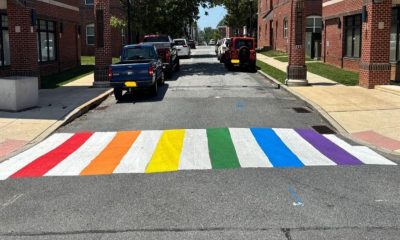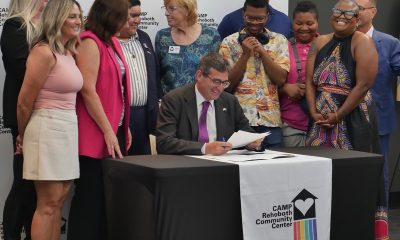Local
Rehoboth theater in ‘design development phase’
Clear Space seeks new home
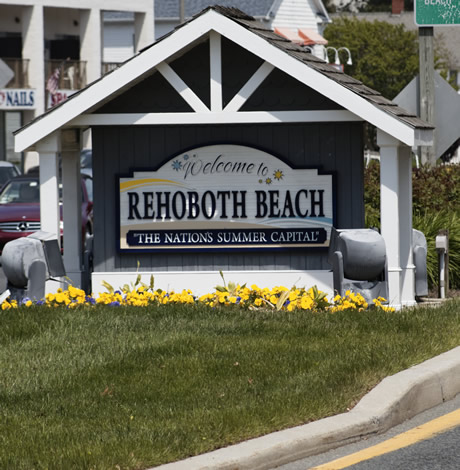
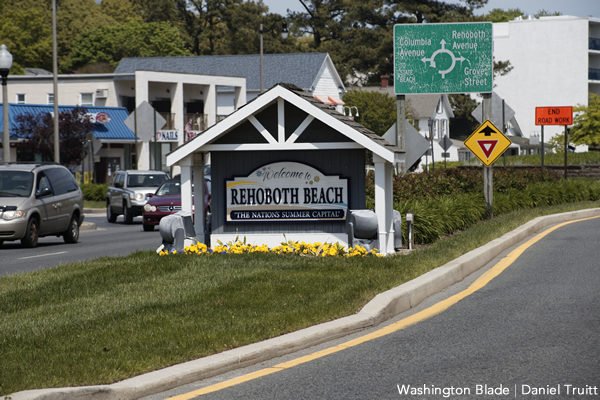
The leader of the Clear Space Theatre in the Delaware resort town of Rehoboth Beach says the theater company will move ahead with its plans to build a larger facility at a new location to house the popular theater.
But Executive Director Wesley Paulson hasn’t disclosed how the Clear Space Theatre Company will accomplish that goal after Rehoboth Beach officials declined to back a proposed change in the zoning law to waive a 128-space parking requirement that Paulson initially said was needed to allow the beloved performing arts theater to build its new theater at 415 Rehoboth Ave. near the entrance to the town.
The Clear Space Theatre Company, founded in 2004, has produced highly acclaimed Broadway-style plays and musicals and operates an arts institute that teaches theater to students of all ages in a former church building it rents on Baltimore Avenue near the boardwalk.
In September 2018, the theater announced plans to build its own larger building that would include a 300-seat theater on Rehoboth Avenue. Theater officials said they made adjustments to the architectural plans for the new 25,600-square-foot building, including lowering its height, so it meets all city codes except a requirement that it include 128 on-site parking spaces.
Paulson said the theater company didn’t have the funds to include more than 28 parking spaces onsite, and urged Rehoboth officials to consider an exemption to the parking requirement. Rehoboth Mayor Paul Kuhns and the City Commission, which is Rehoboth’s legislative body, declined to make any immediate zoning changes and sent the matter to the Rehoboth Planning Commission.
In April 2019, the commission issued a recommendation of no new zoning designations for Clear Space. However, it further recommended an amendment to the city code allowing satellite parking spaces to be leased under a long-term contract to be counted toward the parking requirements, according to the Cape Gazette newspaper.
The Rehoboth City Commission has so far not taken further action on the commission’s recommendation.
“After more than three years of study, the Company has selected this site to construct a new theatre and rehearsal space,” the theater company said in a Jan. 1 press release. “We welcome this opportunity to provide a permanent home for Clear Space and where we can continue to present artistic endeavors of integrity and risk in the City of Rehoboth Beach,” the release quoted Carl Schloegel, the Clear Space board chair, as saying.
“We look forward to building a facility that is designed within City code,” Schloegel added.
In response to an inquiry from the Washington Blade, Krys Johnson, a spokesperson for the City Commission, said the city “has not exempted Clear Space Theatre from any zoning requirements.”
Johnson added that Clear Space Theatre has not submitted any revised plans to the city for the property on which it plans to build its new theater and “therefore no ‘approval’ has been given” for the project.
When asked about Johnson’s comments, Paulson told the Blade in an email, “We have purchased land and will build a new theater on the site.”
Added Paulson, “We are in the design development phase of the project…We have carefully considered feedback from the planning commission in the redesign of our project,” he said. “Once we finish the design development phase our architect and engineer will provide an estimated construction schedule.”
He said the project will be funded by a combination of a capital campaign fundraising effort “supported by the community” and through a mortgage underwritten by a U.S. Department of Agriculture Direct Loan Program.
Virginia
Defying trends, new LGBTQ center opens in rural Winchester, Va.
‘It has taught me that I am not alone in this place’
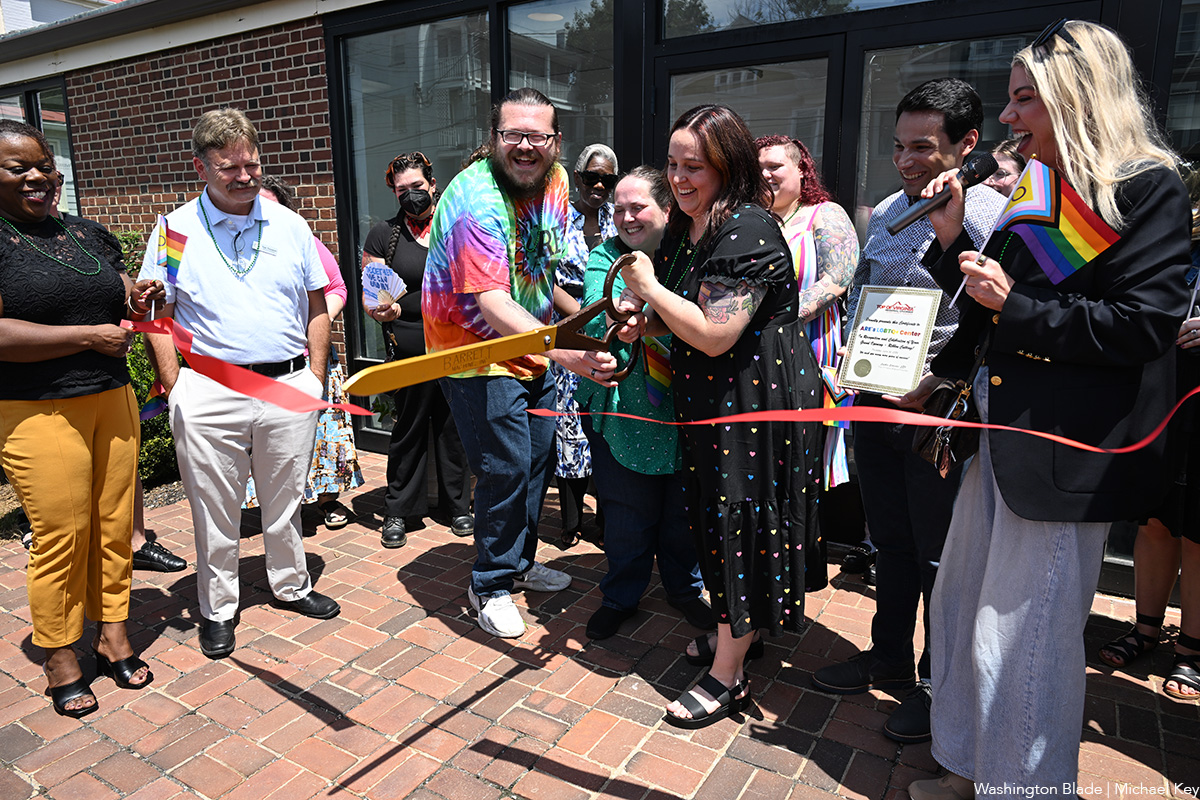
A new LGBTQ community center celebrated its grand opening on June 30 in Winchester, Va., defying recent trends amid a federal crackdown on DEI and LGBTQ funding.
The local HIV/AIDS service organization AIDS Response Effort, Inc. (ARE) worked with a team of volunteers to open the area’s first physical center.
ARE’s R.I.S.E. (Resources, Inclusion, Support and Empowerment) Center, located near the heart of Old Town Winchester on West Piccadilly Street, is more than a renovated bank building to the local LGBTQ community. The empty teller window on the side of the structure and converted vault inside give away the building’s past. But the volunteers, program participants, and well-wishers gathered at the ribbon-cutting ceremony tell the Blade that they are hopeful for a thriving future for the building — and the community.
The Washington Blade spoke with the executive director of ARE as well as the co-directors of ARE’s R.I.S.E. Center during a tour of the facility ahead of the opening.
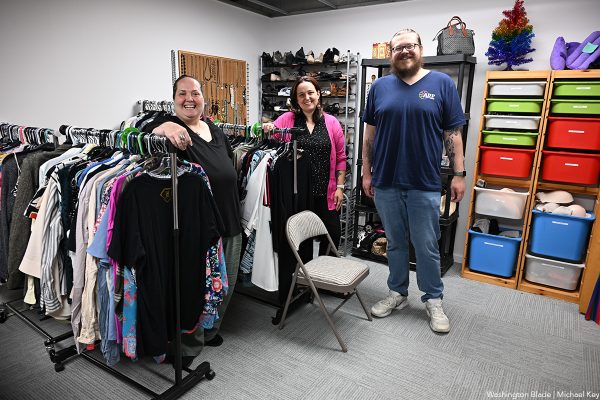
Katy Vance, executive director of ARE told the Blade, “I started [at ARE] about five years ago and we were an AIDS service organization, we have been for about 35 years now. We started as a group of volunteers out at the hospital —with Valley Health, and we’ve grown into a program that provides HIV case management for folks living with HIV in the community.”
Vance explained that as community needs have changed for service organizations like ARE, it has led to some soul-searching among advocates.
“We had this big meeting about, ‘who are we?,’ ‘who do we want to be?,’ ‘who do we want to be in a few years?,’” Vance recalls. “As things shift and change with HIV … we have a lot of folks that come into our office who are newly diagnosed. They will get connected to a medical case manager, they’ll get on medication, and they are undetectable within one to two months, which means they are untransmittable, which is amazing.”
“So, science and technology has come so far,” Vance continued. “And so, who are we when this tends to go in the direction of no longer being the major epidemic it has been for the last 30 years, right?”
“But, when I came in, we also had a general housing program for anyone in the community,” Vance said. “That was confusing for a lot of people who came into our doors trying to figure out who we were and what we are. We called it, our ‘identity crisis,’ essentially.”
“Are we an HIV service organization? Are we a housing program?” Vance asked. “So we worked with our local Goodwill and the board got together and we decided to transition our housing program out and we realized we wanted to open an LGBTQ center.”
“We have had a little bit of pushback as to why an HIV agency is opening a center,” ARE’s R.I.S.E. Center Co-Director Matt Buracker said. “Obviously, HIV and LGBT identities have a long history and a lot of stigma, but we felt like it was kind of irresponsible to talk about one without talking about the other. And we’ve always been supporting the LGBT community, so we’re just expanding our services to encompass more.”
The center seeks to serve the LGBTQ community in a county that Donald Trump carried with more than 63% of the vote in the 2024 election. While ARE receives local and state grants for its operations, the LGBTQ center is currently funded by community donations and a founders’ campaign and is staffed with volunteers.
Vance tells the Blade that the Center met its initial fundraising goal of $50,000 very quickly. The building housing the center was renovated with a combination of grants, donations and volunteer work.

“I think our fundraising goals now are going to be more programmatic so that we can do the things that we want to do,” R.I.S.E. Center Co-Director Mary Bohacek said. “Because Matt and I are great at finding things to do for free. But there are other things that people are asking us to do, craft events or things that aren’t free to do. Eventually, we might need a license if we want to do movie screenings. So there is always going to be a fundraising need to fund the programming, but the building has been a huge success.”
“The support from the community has been overwhelming,” Buracker told the Blade. “We’ve had such a positive response from the community and it’s just it’s been so emotional to see that the need has been here and we are the one to finally do something about it.”
Vance interjected, “And of course, there are community members that aren’t a fan that are ‘keyboard warriors’ that are coming out saying stuff. What is amazing is: we had an article in the paper and they put it up on their Facebook page and people were making just terrible comments. But then, we got new volunteers from that. The community support has been, like Matt said, amazing and overwhelming.”
ARE’s R.I.S.E. Center is a member of CenterLink, a community of LGBTQ centers. Other LGBTQ community centers in the wider region include the Roanoke Diversity Center in Roanoke, Va, the Shenandoah LGBTQ Center in Staunton, Va., Diversity Richmond in Richmond, Va., NOVA Prism Center in McLean, Va., the DC Center for the LGBT Community in Washington, D.C. and the Frederick Center in Frederick, Md. A new MoCo Pride Center is scheduled to open in Bethesda, Md. in August.
While the physical building opened to the public on June 30, the R.I.S.E. Center in Winchester has held events for more than a year.
“We’ve had programming going on for almost two years now,” Bohacek told the Blade. “Our first event was a ‘Friendsgiving.’ There were so many people that showed up that we literally didn’t have enough space: we needed to knock down walls.”
The staff and volunteers at ARE and the nascent Center used that momentum to foster the growth of affinity groups, community groups and services.
Affinity groups are described as “not just support groups or social groups, but rather as something of a hybrid between the two.” As Bohacek says about the affinity groups, “if someone needs community or needs a place to talk about queer issues, they have a space to do that.”
Affinity groups hosted by the Center include a group for trans and gender non-conforming people, a group for the families of trans people, a polyamorous affinity group, an aro-ace group, a “Rainbow Connection” all-purpose group, and a “Gay-RP” affinity group for people 50 and older.
“We also have a young adult group, which is for ages 18-25, which is one of the more vulnerable sections of our community,” Bohacek said. “So we want to make sure that they have places to connect.”
As reported in the Blade, the youth advocacy organizations Hopelab and Born this Way Foundation recently issued a report that suggests LGBTQ youth (ages 15 to 24) living in rural communities face greater challenges than their suburban or urban peers in dealing with their sexual orientation or gender identity, though have significantly benefited from online resources.
“We also have some community-wide programming that allies are welcome attend,” Bohecek said. Programming includes a monthly game night, a volunteer night for the many Center volunteers, as well as the “stitch and bitch” group, who “sit, crochet, embroider and talk.”
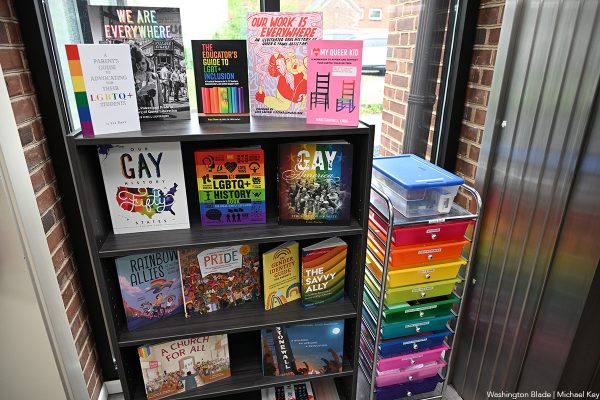
“And Coffee and Coloring!” Bohecek exclaims. “That’s one of my favorites. We like to say it’s about — just sit down, relax, have a cup of coffee — but frankly it’s about community building.”
Bohacek proudly lists the many other services the center offers, including a transgender/gender-affirming closet, which is currently overflowing with donations of clothes.
“We also have an amazing library of all kinds of identities and all kinds of ages for people to come and see,” Bohacek told the Blade. “This building is actually an old bank, so we put our books into the vault.”
The old bank, now vibrant community center, was filled to capacity for the official opening ceremony on a hot Monday afternoon in late June. People from across the Shenandoah Valley who had come to the ribbon-cutting event snacked on rainbow-colored cupcakes as they toured the renovated building.
“To be a gay man growing up in a small, rural area . . . we didn’t have anything like this,” Front Royal, Va. resident Ed McKee told the Blade. Though he lives in a town a few miles away, he works at a salon in Winchester and had come to see the new center opening.
“We didn’t have anything like this when I was growing up,” McKee said as he gestured toward the packed LGBTQ community center. “If we had, it would have made my life so much easier. I probably would have come out sooner — I didn’t come out until I was about 30 — because I would have felt the support, you know?”
“Especially now with everything that is going on in our country,” McKee continued. “We need to show strength in numbers: come together. And the center is allowing for that to happen.”
McKee’s husband, Winchester business owner Paul Miller, agreed.
“I’m hoping that [the Center] can be a great way to connect with people who might not otherwise understand how they can come together,” Miller told the Blade. “And I’m hoping that, while I’m not sure that this is its mission, I’m hoping that it has a political effect in Virginia.”
Members of the community who came to witness the opening gathered outside of ARE’s R.I.S.E. center for the ribbon cutting. Speakers at the ceremony included the Center’s co-director Bohacek.
“Today, we’re celebrating the renovation of the building,” Bohacek began. “But, we’re also celebrating the rise of this community.”
“This community has taught me resilience and it has taught me friendship and it has taught me that I am not alone in this place,” Bohacek told the crowd. “There are people that care. And we are so proud to have a place where we can be ourselves, where anyone and everyone is welcome — and we mean it. So, with that said, let’s keep on rising!”
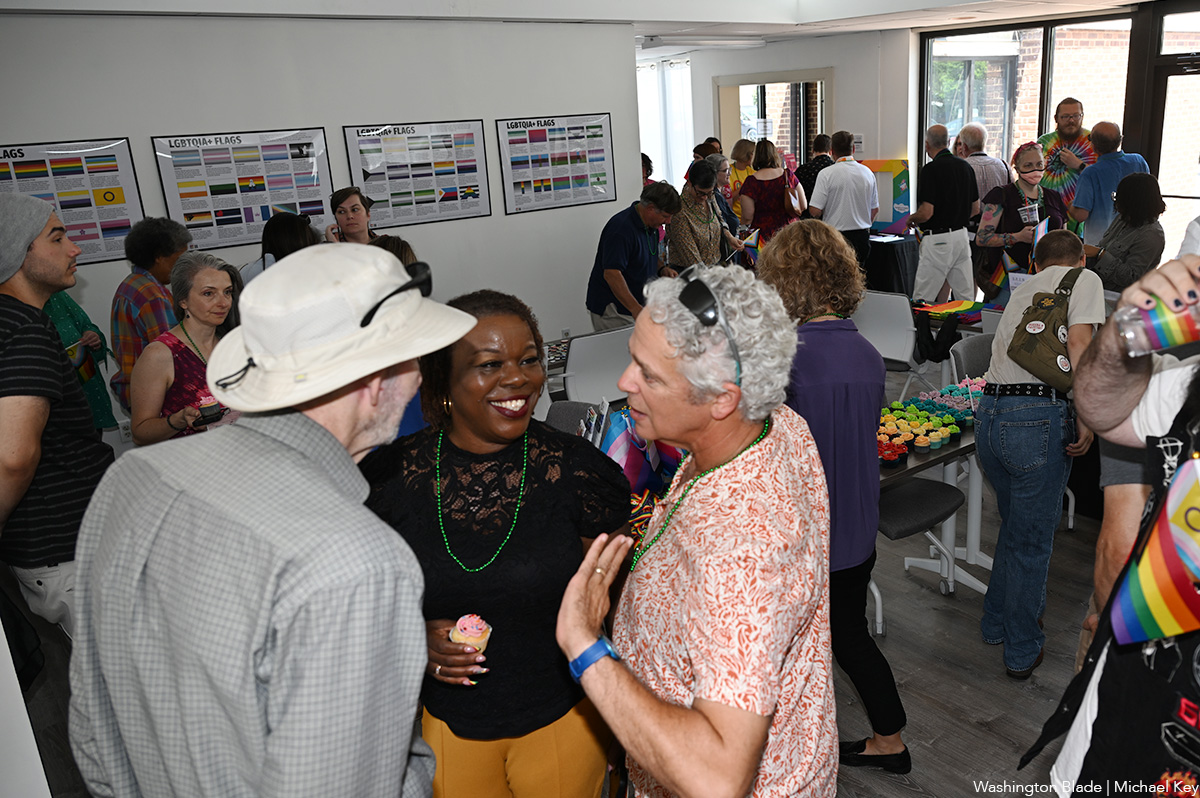
Maryland
Maryland’s oldest rural gay bar — and one of the last — is a log cabin in the woods
The Lodge is a Boonsboro watering hole resembling a log cabin

By SAPNA BANSIL | In the woods of a conservative Western Maryland town of fewer than 4,000 people is an unlikely landmark of state LGBTQ history.
The Lodge, a Boonsboro watering hole that resembles a log cabin, is Maryland’s oldest rural gay bar — one of a few remaining in the country, according to historians.
For about four decades, the Washington County venue has offered safety, escape and community to queer people far from large, liberal cities. Starting Friday night, The Lodge will close out Pride month with one of its biggest parties of the year: a weekend of dancing, drinking and drag in celebration of Frederick Pride, held about 20 miles away in the area’s largest city.
The rest of this article the Baltimore Banner published on June 27 can be read on its website.
Virginia
Va. court allows conversion therapy despite law banning it
Judge in June 30 ruling cited religious freedom.

In 2020, the state of Virginia had banned the practice of conversion therapy, but on Monday, a county judge ruled the ban violates the Virginia Constitution and Religious Freedom Restoration Act, allowing the therapy to start once more.
The conversion therapy ban, which can be seen in Va. Code § 54.1-2409.5 and 18VAC115-20-130.14, was overturned on June 30 as a result of two Christian counselors who argued that their — and all Virginia parents’ — constitutional right to freedom of religion had been encroached upon when the state legislature passed the ban.
A Henrico County Circuit Court judge sided with John and Janet Raymond, two Christian counselors represented by the Founding Freedoms Law Center, a conservative organization founded in 2020 following Virginia’s conversion therapy ban. Virginia’s Office of the Attorney General entered a consent decree with FFLC, saying state officials will not discipline counselors who engage in talk conversion therapy.
Conversion therapy, as the legislation described it, is considered to be “any practice or treatment that seeks to change an individual’s sexual orientation or gender identity, including efforts to change behaviors or gender expressions or to eliminate or reduce sexual or romantic attractions or feelings toward individuals of the same gender.” The ban’s reversal will now allow parents to subject their children to these practices to make them align better with their religion.
This decision comes despite advice and concern from many medical and pediatric organizations — including the American Psychiatric Association, American Psychological Association, American Association for Marriage and Family Therapy, and the American Counseling Association, to name a few — all of which denounce conversion therapy as dangerous and harmful to those subjected to it.
The American Medical Association, the largest and only national association that convenes more than 190 state and specialty medical societies, says that “these techniques are the assumption that any non-heterosexual, non-cisgender identities are mental disorders, and that sexual orientation and gender identity can and should be changed. This assumption is not based on medical and scientific evidence,” with attached data indicating people subjected to conversion therapy are more likely to develop “significant long-term harm” as a result of the therapy.
The AMA goes as far as to say that they outright “oppose the use of reparative or conversion therapy for sexual orientation or gender identity.”
FFLC has a clear goal of promoting — if not requiring — conservative ideology under the guise of religious freedom in the Virginia General Assembly. On their website, the FFLC argues that some progressive policies passed by the Assembly, like that of freedom from conversion therapy, are a violation of some Virginians’ “God-given foundational freedoms.”
The FFLC has argued that when conservative notions are not abided by in state law — especially when it involves “God’s design for male and female, the nuclear family, and parental rights” — that the law violates Virginians’ religious freedom.
A statement on the FFLC’s website calls gender dysphoria among children a “contagion” and upholds “faith-based insights” from counselors as equal — in the eyes of the law — to those who use medical-based insights. This, once again, is despite overwhelming medical evidence that indicates conversion therapy is harmful.
One study showed that 77 percent of those who received “sexual orientation change efforts,” or conversion therapy, experienced “significant harm.” This harm includes depression, anxiety, lowered self-esteem, and internalized homophobia. In addition, the study found that young LGBTQ adults with high levels of parental or caregiver rejection are “8.4 times more likely to report having attempted suicide,” with another study finding that “nearly 30 percent of individuals who underwent SOCE reported suicidal attempts.”
Virginia Senate Majority Leader Scott Surovell, a Democrat representing Fairfax, said that the overturning of the ban on religious merit disregards the entire concept of having professionally licensed counselors.
“I have no problem if somebody wants to go look at religious counseling from their priest or their minister, their rabbi, their imam — that’s perfectly fine,” Surovell told the Virginia Mercury. “When somebody goes to get therapy from somebody licensed by the commonwealth of Virginia, there’s a different set of rules applied. You can’t just say whatever you want because you have a license. That’s why we have professional standards, that’s why we have statutes.”
-

 U.S. Supreme Court5 days ago
U.S. Supreme Court5 days agoSupreme Court to consider bans on trans athletes in school sports
-

 Sports5 days ago
Sports5 days agoTrans cyclist’s victory sparks outrage in conservative media
-

 Israel5 days ago
Israel5 days agoActivist recalls experience in Tel Aviv after Israel-Iran war began
-

 Congress5 days ago
Congress5 days agoCongress passes ‘Big, Beautiful Bill’ with massive cuts to health insurance coverage



